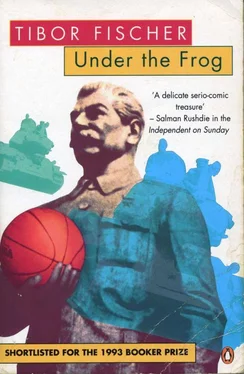Tibor Fischer - Under the Frog
Здесь есть возможность читать онлайн «Tibor Fischer - Under the Frog» весь текст электронной книги совершенно бесплатно (целиком полную версию без сокращений). В некоторых случаях можно слушать аудио, скачать через торрент в формате fb2 и присутствует краткое содержание. Жанр: Современная проза, на английском языке. Описание произведения, (предисловие) а так же отзывы посетителей доступны на портале библиотеки ЛибКат.
- Название:Under the Frog
- Автор:
- Жанр:
- Год:неизвестен
- ISBN:нет данных
- Рейтинг книги:3 / 5. Голосов: 1
-
Избранное:Добавить в избранное
- Отзывы:
-
Ваша оценка:
- 60
- 1
- 2
- 3
- 4
- 5
Under the Frog: краткое содержание, описание и аннотация
Предлагаем к чтению аннотацию, описание, краткое содержание или предисловие (зависит от того, что написал сам автор книги «Under the Frog»). Если вы не нашли необходимую информацию о книге — напишите в комментариях, мы постараемся отыскать её.
Shortlisted for Booker Prize 1993
Set in post-war Hungary between 1944 and 1956, this ferociously funny and bitterly sad story follows the fortunes of two young men in the pursuit of sex and the avoidance of work and army service. They survive the chaos of communism by becoming part of a travelling basketball team.
Under the Frog — читать онлайн бесплатно полную книгу (весь текст) целиком
Ниже представлен текст книги, разбитый по страницам. Система сохранения места последней прочитанной страницы, позволяет с удобством читать онлайн бесплатно книгу «Under the Frog», без необходимости каждый раз заново искать на чём Вы остановились. Поставьте закладку, и сможете в любой момент перейти на страницу, на которой закончили чтение.
Интервал:
Закладка:
Being late was incomprehensible to him, dug-up tablets in some ancient tongue. It was more confusion than anger: ‘But we said eleven o’ clock’. He would repeat this, on and on, tonally turning it up and down, with the determination of a code-breaker trying to crack an unbreakable code. Hepp’s solar punctuality never failed him. As far as anyone knew he had only been late for an appointment once in his life and that was when Pataki, forewarned Hepp was due at a coaches’ seminar, had slipped into Hepp’s office just as Hepp was getting ready to leave. Under the cover of some anodyne conversation, Pataki had withdrawn, palming the key to Hepp’s office door. He had then locked the door from the corridor and had joined everyone outside, on the other side of the street, where they had a good view of Hepp’s office. Within minutes Hepp was loudly ordering them to let him out, shouting at times with great pathos from his second floor window. Eventually, he prevailed on a passer-by to provide a ladder but by that point he was an irrecuperable fifteen minutes late.
Matasits was, naturally enough, behind Gyuri’s appearance in front of the disciplinary tribunal. It was boring, in a way. Every time Gyuri played a game with Matasits refereeing, Gyuri would speedily accumulate his five fouls and be sent off before he could cover the length of the court, whether or not he was actually doing any fouling or even getting into the ball’s neighbourhood. Matasits’s compulsion to blow his whistle every time he saw Gyuri had long before made it clear to Gyuri that Matasits had him down as a bad element, a committed recidivist.
While Gyuri would have freely conceded that the referees wouldn’t be voting him the sportingest player on the nation’s basketball courts, the accruing of this fictional blame was irritating. No matter how exemplary Gyuri was on court, no matter how preposterously courteous he was – handing over the ball on a silver plate to the opposition at the slightest suggestion they had an interest in it, shunning contact with the opposing players as if they were radioactive lepers, if Matasits was there, he was off. There was a rumour that Matasits believed Gyuri responsible for a delivery of two hundred pairs of Soviet spectacles to his home and was seeking revenge for this insult by freight.
However, getting to the tribunal was a first for Gyuri. His gift for lurking in the referees’ blind spots usually enabled him to nobble the opposition with impunity; he had also developed a prestidigitator’s talent for sending the referees’ attention the wrong way so he could elbow, grab trousers and tread on feet under the nose of authority. Hepp would even evaluate the quality of his fouling during the post-match analysis, ‘adequate’, ‘stylish’ or on the day he had head-butted Princz (a man who regarded basketball matches as an unlimited opportunity for the grabbing of testicles) and got Princz stretchered off, ‘world-class’.
However, with Matasits on the sidelines, Gyuri would stick resolutely, if futilely, to nobility. But during a match with the Army, which the Army, despite Pataki’s absence, was scarcely winning, Gyuri and an Army player had gone up for a ball. The Army player had got the ball and had Gyuri crash to the ground where he had remained while the Army player winged his way to Locomotive’s basket and dumped the ball through the ring for two easy points. Like everyone else, Róka had looked on Gyuri’s collapse as an overly histrionic attempt to get the ball back ‘It’s okay,’ Róka had said to the slumped Gyuri, ‘you can get up now.’
But Gyuri hadn’t got up because he was firmly unconscious. Matasits booked him for wilfully obstructing the course of play, saying in all his years of refereeing he had never seen such blatant fakery and that this was going to the basketball council, particularly as, when Gyuri had regained contact with the world and learned what was going on, he had made a groggy attempt to strangle Matasits.
The tribunal was composed of three inert, overflowingly bored gentlemen behind a sweeping desk: they looked as if they were left in the room when the tribunal wasn’t sitting.
Matasits kicked off. ‘Esteemed tribunal, we are dealing here with a debaser of what is most sacred to man.’ He read badly from notes. Gyuri settled down, judging from the depth of Matasits’s sheets that it would be a long haul. Matasits had been leaning on his dictionary. In a number of rehashes, he denounced Gyuri as the fountain of all evil, a homicidal neanderthal, who wandered around the court on his knuckles, only employing his limited power of speech to heap abuse on duly empowered officials. To Matasits’s gaugeable and progressive disappointment, the tribunal didn’t gasp with horror but took notes emotionlessly albeit diligently. Having counted on something on the lines of a burning at the stake, with a little quartering thrown in for good measure, Matasits left the room, dejected at the coolness of his reception. The bored faces buoyed Gyuri a little, although he had a strong awareness of how even bored people could really disembowel a career.
Then it was Hepp’s turn: ‘Gentlemen, while I can in no way whatsoever condone Fischer’s behaviour, I should like to point out that he has been under enormous, enormous, pressures. His mother died recently, and this bereavement combined with his voluntary coaching at the Ferencvaros orphanage, in addition to his outstanding work-record at his place of employment…’ It was good stuff, though Gyuri wasn’t sure there was an orphanage in Ferencvaros.
To conclude, he was asked to stand and make any additional mitigation. ‘I’d like to apologise, gentlemen, for wasting your valuable time and I can assure you this will be the last time you will see me in such circumstances- ’ The tribunal could endure no more. They were paid to sit, not to listen. It was lunch time and Gyuri was cut off by the man in the middle. ‘Fine of fifty forints’ was the verdict. Gyuri, overwhelmed by the modesty of the fine, had a rash impulse to offer to round it up to a hundred if he could punch Matasits in the mouth.
‘Aren’t you going to the demonstration?’ Hepp asked outside. ‘Everyone else seems to be.’
‘If I thought it could make the slightest difference, I’d be leading it.’
Gyuri debated whether to go to work. It was a short debate. The Feather Processing Enterprise could do without him for an afternoon. It had done pretty well without him in the two months he had been there. Hepp had fixed a job for him there; as a good amateur basketball player, Gyuri needed a job. Once he had qualified as an accountant he resolved he should have a position with more status, more prospects and more pay than knocking out the occasional morse code for the railways.
The post of planner had been wangled for him at the Feather Processing Enterprise. Obviously, one didn’t want a job where there was a danger of work but it would have been nice to have had stimulating or glamorous surroundings in which to collect one’s wages.
All Gyuri had done in his two months of employment, out of curiosity, was to take the figures supplied by the Ministry stipulating the amounts the factory should be producing according to the Five Year Plan, and divide these totals by the number of units in the factory. Then, having discovered the unit production figures he added it all up again to get the production figure desired by the Plan. What was actually happening in the factory, he didn’t know. Gyuri doubted that anyone knew or even wanted to know. Most of the little time that he was in his office, his fellow economist, Zalan, and he, would flick matches (fired from the abrasive strip on the matchbox) at each other’s desks, taking bets on which stacks of paper would ignite.
He had only got the Plan details by accident after he encountered Fekete, the director of the Feather Processing Enterprise, as he was belting down a corridor with a couple of fishing-rods. He recognised Fekete because he had been a celebrated all-in wrestler before the war, known as ‘The Fat Boa’. The rumour was he had lent money to members of the Central Committee in the days of their illegality, when they shared the same boarding-house.
Читать дальшеИнтервал:
Закладка:
Похожие книги на «Under the Frog»
Представляем Вашему вниманию похожие книги на «Under the Frog» списком для выбора. Мы отобрали схожую по названию и смыслу литературу в надежде предоставить читателям больше вариантов отыскать новые, интересные, ещё непрочитанные произведения.
Обсуждение, отзывы о книге «Under the Frog» и просто собственные мнения читателей. Оставьте ваши комментарии, напишите, что Вы думаете о произведении, его смысле или главных героях. Укажите что конкретно понравилось, а что нет, и почему Вы так считаете.












